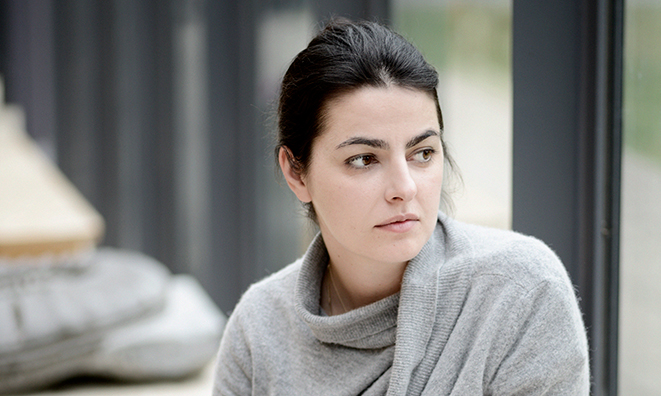Whether listening to her family’s LP and magnetic tape collection or attending the Plovdiv Verdi festival every summer, Dobrinka Tabakova was surrounded by music from an early age. Many of Dobrinka’s earliest and fondest memories are singing in school or chapel choirs, cocooned against the beautiful and magical backdrop of the Rhodope Mountains. As well as the dramatic landscape that surrounds Plovdiv, it also – as one of the oldest cities in the world – boasts a vast treasure of Thracian and Roman ruins.
Away from the old
In 1991, at the age of 11, Dobrinka moved to London when her father was invited to take up a position in medical physics at King’s College London. The move from Plovdiv’s relics of antiquity to London, with its endless pursuit of the new – most evident in Canary Wharf constructions that dwarfed the city – must have been a stark contrast to what she’d left ‘back home’.
It may well have been this first significant move that lends such a strong sense of maturity and sensitivity to her work. Even as a student, the composer John Adams praised her music as “extremely original and rare”. Critics have described her work as having “huge emotional depth” that perhaps hints at a landscape left behind, among “glowing tonal harmonies and grand, sweeping gestures.”
To the BBC
This transition at such a young age may also have contributed to her desire to always seek out new experiences in music, an instinct that has brought her to the attention of The BBC Concert Orchestra, who have recently appointed her as their Composer in Residence.
The move is part of the orchestra’s commitment to new music. And there is no doubt that Dobrinka’s talent and innate curiosity, combined with one of the most versatile orchestras in the world, will produce some exciting and unusual results. As Alan Davey, Controller of BBC Radio 3, says, “The BBC Concert Orchestra’s adventurous spirit and Dobrinka’s creative musicality are a perfect match and I look forward to showcasing the results of their partnership to our audiences.”
For Dobrinka, it is an “opportunity to bring as much living music to different audiences”, a factor she believes to be particularly important within contemporary music. She says: “I’m so lucky to be offered the chance to work with such a diverse orchestra – from classical to jazz, folk and film – they work with an exciting variety of music.”
“I have no preconceived ideas regarding how I’ll approach the work,” she adds. “I anticipate that it will be a freeing experience, where the music will develop organically from conversations with the orchestra.”
Champion collaborators
Dobrinka’s collaborative spirit was shaped from an early age, when she began studying composition and piano, and conducting at Alleyn’s School and the Royal Academy of Music Junior Department. At the age of 12, she began to find musicians to play her work, a practice that consolidated the importance of the relationship between composer and performer.
“I am inspired by the performers I write for – their energy and passion” she says. “I imagine them on stage and recreate that in the music.”
A group of regular ‘champions’ of her music, amongst them violist/conductor Maxim Rysanov and violinist Janine Jansen, featured on Dobrinka’s debut album on ECM Records, String Paths. The album received a Grammy nomination, reached No. 2 in the UK’s Specialist Classical charts and attracted international praise.
Seeking the new
While Dobrinka studied at the Guildhall School of Music & Drama, she was always looking for people who were interested in new music. She says: “It was the classics which ignited my love for music, but as a composer, I was interested in finding performers who also wanted to play the next generation of music and push the repertoire. I was always writing with that purpose in mind.”
As President of the Contemporary Music Society, she was driven by a desire to create a community that could share ideas, experiment and create exciting collaborations within an environment of collegiate support. She then channelled this into her work promoting music by living composers, when she coordinated The Cutting Edge Series at the British Music Information Centre.
Success and recognition
Dobrinka’s transition from university into full time composing was fairly seamless. Indeed, it was while she was studying at Guildhall in 2002 that she won the Barclays Private Banking Prize for the anthem for the Queen’s Golden Jubilee Celebrations – a choral composition that was performed at St Paul’s Cathedral. A string of prizes and awards followed in subsequent years, which included the Adam prize of King’s College London, where she completed her PhD in composition, and her first significant American accolade – first prize and Sorel Medallion in choral composition, in 2011. Choral music continues to form a significant part of her output and most recently she was appointed composer in residence with Truro Cathedral.
Researching Shakespeare
Dobrinka particularly enjoys the research part of composition, a fact that could be attributed to her scientific background, with both her parents working in medical physics. One of her most substantial choral and research projects to date was to write a cantata for the 400th anniversary of Shakespeare’s death. Created during her residency with the Stratford-upon-Avon based Orchestra of the Swan, the cantata required extensive research, which led Dobrinka to uncover rare J.M.W. Turner sketches of a trip to the poet’s birthplace, which she used as inspiration.
She read all of Shakespeare’s plays, imagining how the words could be successfully structured to music, and consulted with Dominic Dromgoole, the then Artistic Director of Shakespeare’s Globe. “I love that all this expertise is open to you to take inspiration from,” she says. “This is what I enjoy about the research stage.”
Dobrinka continues to embrace many different collaborations. The music she wrote for the New Music Biennial film Pulse, directed by Ruth Paxton, combined gamelan with piano and percussion. She says, “It was exciting to work with someone who deals with structure and time.”
She describes her generation of composers as ‘lucky’, benefitting from a relaxation in styles of composing. She values the ability of composers to create accessible works that also challenge. Indeed, one critic described her as a contemporary artist whose “ideas do not discard the training that shaped them.”
Inspiring women
Although statistics show that female composers’ work is underrepresented in the contemporary music world, there is no doubt that many aspiring young composers will look to Dobrinka as an inspiration, just as she admired the generation before her.
Dobrinka names Judith Weir, Sofia Gubaidulina and Kaija Saariaho as just some of her early influences – female composers who made significant impacts with their work, so that it would be possible for the next generation “not to feel excluded.”
Looking to the future
She believes that technology continues to create many new opportunities – for example, the live streaming of concerts. She adds, “technology also has a responsibility to nurture creativity and the two should develop alongside, not at the expense of each other.”
Her excitement for the way in which contemporary music has developed over the past 25 years is palpable. “The variety of music out there is some of the richest, and most exciting there’s ever been,” she says. “Orchestral instruments are fusing many different genres from jazz and electronica to folk. I think it’s important we keep this work visible and celebrate it regularly.”
Article first featured in The Works [2017]





